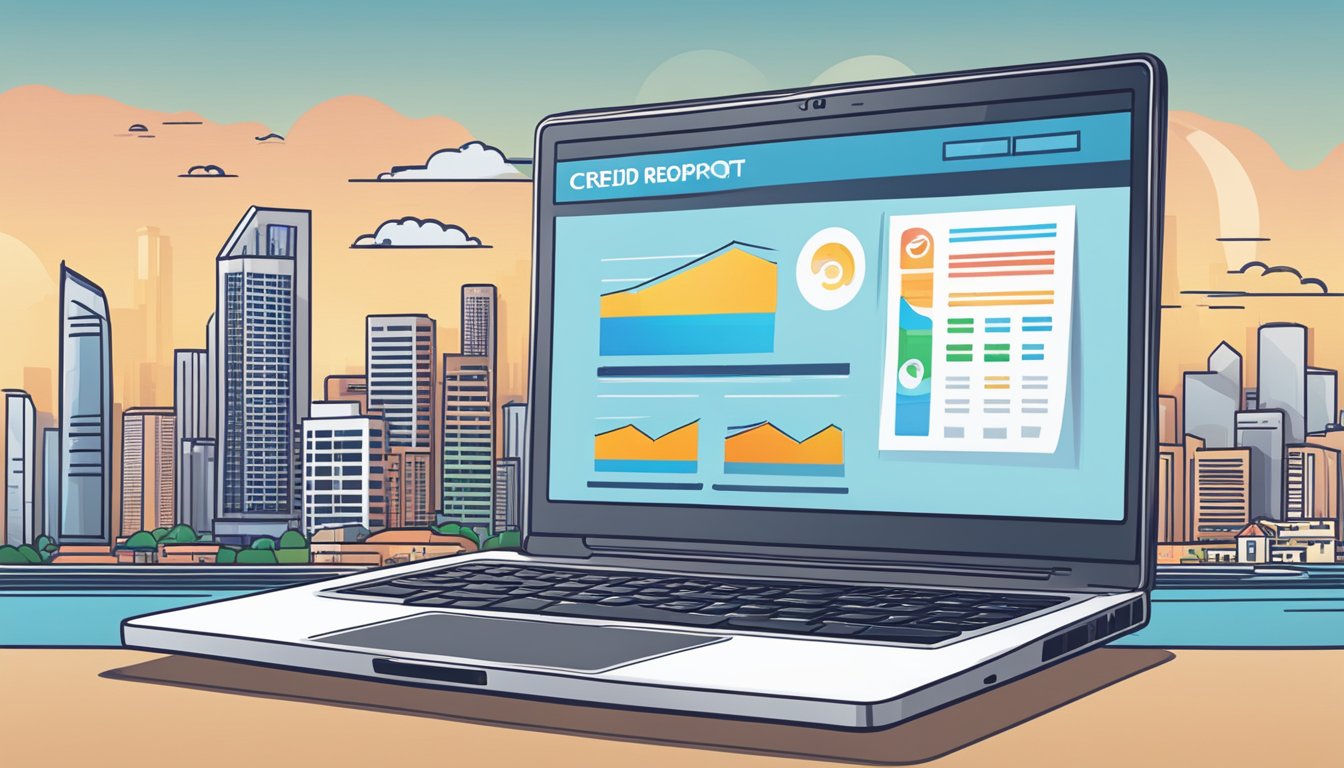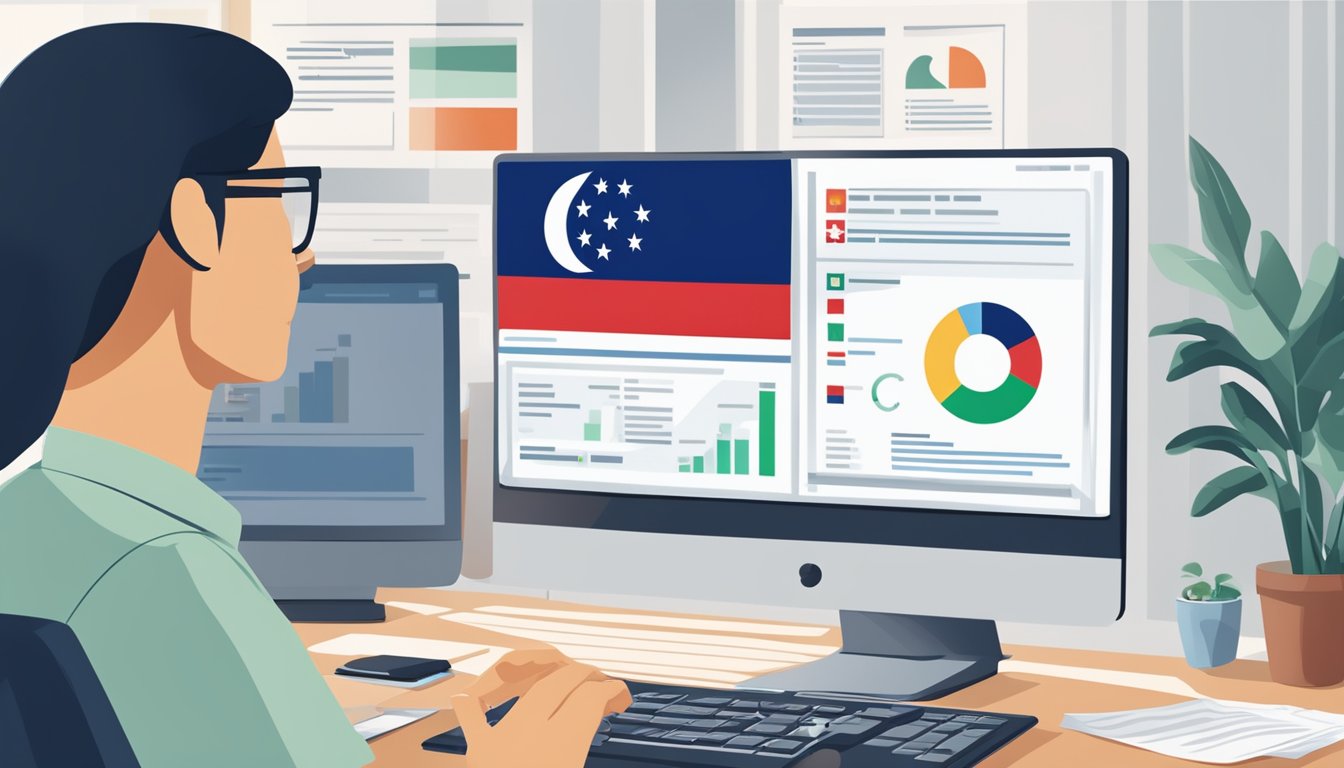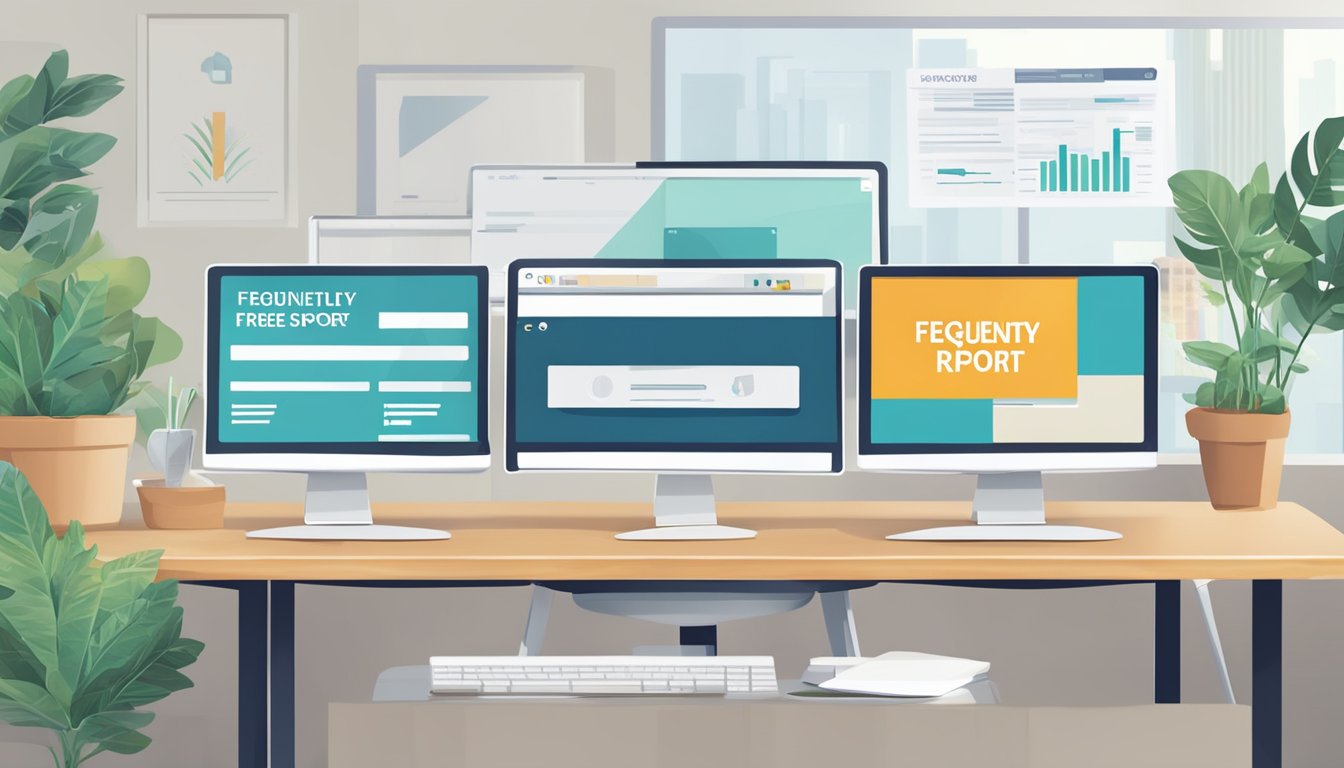Introduction:

If you are a Singaporean resident, you are entitled to receive a free credit report once a year, which is a valuable tool in managing your finances. Your credit report is a record of your credit history and is used by lenders to determine your creditworthiness. It contains information such as your credit accounts, payment history, and outstanding debts.
Understanding Credit Reports in Singapore:
Credit reports in Singapore are produced by Credit Bureau Singapore (CBS), which is the most comprehensive consumer credit bureau in Singapore. CBS receives uploads from all retail banks and major financial institutions, providing a complete picture of your credit history. It is important to understand your credit report in order to maintain good credit health and improve your credit score.
How to Obtain Your Free Credit Report:
To obtain your free credit report in Singapore, you can visit the CBS website and submit an online application. You will need to provide your personal information, such as your name, address, and identification number. Once your application is processed, you will receive your credit report by mail within seven business days. It is important to review your credit report for accuracy and report any errors to CBS.
Key Takeaways
- Your credit report is a valuable tool in managing your finances and is used by lenders to determine your creditworthiness.
- Credit Bureau Singapore (CBS) is the most comprehensive consumer credit bureau in Singapore.
- You can obtain your free credit report by submitting an online application on the CBS website.
Understanding Credit Reports in Singapore

If you’ve ever applied for a loan or credit card in Singapore, you may have heard of a credit report. A credit report is a document that contains your credit history, credit rating, and other credit-related information. It is used by lenders to assess your creditworthiness and determine whether you are a good candidate for a loan or credit card.
Components of a Credit Report
A credit report typically contains the following components:
-
Personal Information: This includes your name, address, date of birth, and other personal details.
-
Credit Accounts: This section lists all your credit accounts, such as credit cards, personal loans, and mortgages. It includes information such as the account balance, credit limit, and payment history.
-
Credit Inquiries: This section lists all the times your credit report has been accessed. This includes inquiries made by lenders when you apply for credit, as well as inquiries made by yourself.
-
Public Records: This section lists any public records related to your credit history, such as bankruptcies, court judgments, and tax liens.
Credit Bureau Singapore (CBS) Explained
Credit Bureau Singapore (CBS) is Singapore’s most comprehensive consumer credit bureau. It collects credit data from all retail banks and major financial institutions in Singapore. CBS then uses this data to create credit reports for individuals and businesses.
CBS offers both free and paid credit reports. If you have recently applied for a new credit facility with any of CBS members, you are entitled to receive a free credit report. Otherwise, you can purchase a credit report online for $6.42.
It’s important to regularly check your credit report to ensure that the information is accurate. If you notice any errors, you can dispute them with CBS. A good credit score in Singapore is anything above 1,800. A high credit score can increase your chances of being approved for a loan or credit card, as well as help you get better interest rates and terms.
In conclusion, understanding your credit report is essential if you want to maintain good creditworthiness in Singapore. By regularly checking your credit report and ensuring that the information is accurate, you can improve your credit score and increase your chances of being approved for credit in the future.
How to Obtain Your Free Credit Report

If you are looking to obtain your free credit report in Singapore, there are a few steps you need to follow. In this section, we will walk you through the process so you can get your credit report without any hassle.
Steps to Access Free Credit Report
To access your free credit report, you need to visit the Credit Bureau Singapore (CBS) website. You will need to provide your SingPass ID to log in. If you do not have a SingPass ID, you can create one on the SingPass website.
Once you have logged in, you can access your credit report for free. The report will contain information about your credit history, including your credit score, credit accounts, and payment history.
SingPost and CrimsonLogic Service Bureaus
If you do not have a SingPass ID, you can also obtain your free credit report from the SingPost or CrimsonLogic service bureaus. To do this, you will need to provide your NRIC or FIN number and a valid email address.
SingPost and CrimsonLogic will send you an email with a link to your free credit report. The report will contain the same information as the report you obtain from CBS.
It is important to note that you can only obtain one free credit report per calendar year. If you want to obtain additional reports, you will need to pay a fee.
By following these simple steps, you can obtain your free credit report in Singapore and keep track of your credit history. Knowing your credit score and credit history can help you make informed financial decisions and improve your overall financial health.
Analysing Your Credit Score

Your credit score is a four-digit number that represents your creditworthiness. It is an important factor that lenders use to determine whether you are eligible for a loan or credit card. A good credit score in Singapore is usually between 750 to 850. If your score falls below this range, you may find it challenging to get approved for credit.
Understanding Your Credit Score Risk Grade
Your credit score risk grade is a rating that reflects the probability of default. It ranges from AA to HH, with AA being the best and HH being the worst. The risk grade is based on your credit history and other factors such as your income and debt-to-income ratio.
Factors Influencing Credit Scores
Several factors influence your credit score, including your payment history, credit utilization, length of credit history, and types of credit used. Your payment history is the most crucial factor in determining your credit score. Late payments or missed payments can have a negative impact on your score.
Credit utilization is the percentage of your available credit that you are currently using. It is recommended that you keep your credit utilization below 30% to maintain a good credit score. The length of your credit history also plays a role in determining your credit score. The longer your credit history, the higher your score.
In conclusion, your credit score is an essential aspect of your financial health. It is crucial to maintain a good credit score in Singapore to increase the probability of getting approved for credit. By understanding your credit score risk grade and the factors that influence your credit score, you can take steps to improve your score and maintain a healthy credit profile.
Improving Your Credit Health

If you’re looking to improve your credit health, there are a few strategies you can use to enhance your creditworthiness and avoid common credit mistakes. Here are some tips to help you get started:
Strategies to Enhance Creditworthiness
-
Calculate your credit score: Before you can improve your score, you need to know where you stand. Check your credit report regularly and use online tools to calculate your score. This will help you identify areas where you need to improve.
-
Pay your bills on time: Late payments can hurt your credit score. Make sure you pay your bills on time every month, including credit card bills, loan payments, and utility bills.
-
Monitor your credit payment history: Your credit payment history is an important factor in your credit score. Make sure you have a good record of paying your bills on time.
-
Keep your credit accounts open: Closing credit accounts can hurt your credit score. Keep your accounts open and use them responsibly.
-
Limit recent credit applications: Applying for too much credit in a short period can hurt your credit score. Limit your credit applications and only apply for credit when you need it.
Avoiding Common Credit Mistakes
-
Late payments: Late payments can damage your credit score. Make sure you pay your bills on time every month.
-
Account status history: Your account status history is an important factor in your credit score. Make sure you keep your accounts in good standing.
-
Improve your score: There are many ways to improve your credit score, such as paying your bills on time, keeping your credit accounts open, and limiting your credit applications.
-
Mistakes: Mistakes on your credit report can hurt your credit score. Make sure you check your credit report regularly and dispute any errors.
-
Fraudulent use: If you suspect fraudulent use of your credit, report it immediately to the relevant authorities.
Improving your credit health takes time and effort, but it’s worth it in the long run. By following these strategies and avoiding common credit mistakes, you can improve your creditworthiness and achieve your financial goals.
Credit-Related Financial Products in Singapore

If you are looking for financial products in Singapore, there are several options available to you. Whether you are looking for a personal loan, car loan, mortgage, or credit card, there are many lenders and financial institutions that can help.
Types of Loans and Credit Cards
There are many types of loans available in Singapore, including personal loans, car loans, renovation loans, education loans, and business loans. Each type of loan has its own set of requirements and interest rates. When applying for a loan, it is important to consider your repayment history and income to ensure that you are eligible for the loan.
Credit cards are another popular financial product in Singapore. They offer a convenient way to make purchases and can be used for a variety of purposes, including travel, shopping, and dining. When choosing a credit card, it is important to consider the interest rates, credit limit, and rewards program offered by the card.
Understanding Interest Rates and Credit Limits
Interest rates are an important factor to consider when applying for a loan or credit card. They determine how much you will pay in interest over the life of the loan or credit card balance. It is important to compare interest rates from different lenders to ensure that you are getting the best deal.
Credit limits are another important factor to consider when applying for a credit card. They determine how much you can spend on the card before reaching your credit limit. It is important to choose a credit card with a credit limit that is appropriate for your spending habits and financial situation.
In Singapore, licensed moneylenders and banks offer a variety of financial products to help you achieve your financial goals. By understanding the different types of loans and credit cards available, as well as the interest rates and credit limits associated with each, you can make informed decisions about your financial future.
Frequently Asked Questions

How can I obtain my full credit report at no cost?
You can obtain a free credit report in Singapore when you apply for a loan, credit card, overdraft, or home loan. The Credit Bureau Singapore (CBS) is the authorized credit bureau in Singapore. You can also get your credit report for free if you have received an approval or rejection letter for a credit application.
What steps should I follow to access my credit bureau report for free?
To access your credit bureau report for free, you need to visit the CBS office in person or apply online. If you opt for the walk-in option, you will need to provide the necessary identification documents. If you apply online, you will need to provide your SingPass ID and password.
Can foreigners also secure a free credit report in Singapore?
Yes, foreigners can also secure a free credit report in Singapore. However, they will need to provide additional identification documents such as their passport or employment pass.
Is acquiring a free credit report online a secure process?
Yes, acquiring a free credit report online is a secure process. The CBS website uses secure encryption technology to protect your personal information.
Where can I download my credit report without any charges?
You can download your credit report for free from the CBS website or visit their office to get a hard copy.
Which apps offer the service of providing a free credit report in Singapore?
There are several apps that offer the service of providing a free credit report in Singapore. However, it is important to make sure that the app is legitimate and authorized by the CBS before providing any personal information. Some of the popular apps include Credit Bureau Singapore, Credit Bureau Monitor, and Credit Bureau Watch.
Remember, having access to your credit report is important in ensuring that your credit score is accurate and up-to-date. Knowing your credit score can help you make informed decisions when applying for loans or credit cards, and can help you identify any errors or fraudulent activities.




